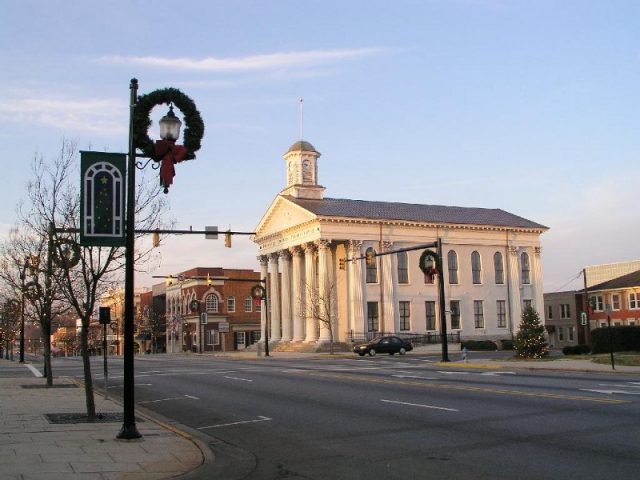Following the surprising rise and election of Donald Trump, many think pieces have been penned about why it is that so many millions of voters were drawn to such a controversial and unconventional candidate. While Hillary Clinton dominated the coasts and cities, garnering strong support from those with a college degree, Donald Trump ruled the rural areas, the so-called “flyover states”. His message of giving a voice to the voiceless resonated with many in small towns that have seen their local industry devastated by globalization and automation over the last two decades. What was it like in these small towns before the factories closed up shop?
In an article written for Medium, Ian Williams tells of his childhood growing up in Lexington, NC.He describes the small city of 15,000 as a “minor boomtown” during the 1980s due to a concentration of factories that produced furniture, textiles and porcelain, among other goods. Williams says that while no one in town could expect to grow exceedingly rich by working in the factories, they could have a comfortable middle class life due to decent wages and the security that comes from a unionized job.
All that changed in the 1990s. Due to NAFTA (the North American Free Trade Agreement), many of the factories moved their operations to Mexico where labor laws are more lax and wages are lower. These closures had a negative effect on all aspects of the city, from school funding to the success of locally owned businesses. It is in towns such as Lexington, Williams writes, where Donald Trump’s message finds an audience.
Simulacrum
In this passage he describes the decline of his hometown:
… The whole town, a way of life, just disappeared, replaced by some shambling simulacrum of what was. There are jobs, of course, but not the factory jobs. Menial jobs, by comparison. Working at Wal-Mart for minimum wage, fast food.
(ˌsimjəˈleɪkrəm)
Noun
1. A faint trace or semblance.
Ne’er do well
In this passage he talks about how when he was growing up, his friends, although of different races and a little rough around the edges, still got along well:
… I remember being in 6th grade and some throwdown happened which I can’t remember all the details of, an interracial shooting or something outside my limited understanding of things.The KKK was set to show up, or so the rumors said. And in response, even more rumors said the Black Panthers were going to show up to stand them down. And I had these two friends, real ne’er do wells, who were friends with each other, one black, one white, and completely ensconced in what you might consider the typical Southern working class experience for each race.
(ˈnɛə.duˌwɛl)
Noun
1. A person without a means of support; an idle, worthless person; a loafer; a person who is ineffectual, unsuccessful, or completely lacking in merit; a good-for-nothing.
2. A person who is up to no good; a rogue.
Ostentatious
In this passage he talks about going to a party at the house of a coworker of his parents:
… After that, we went to a separate party. It was — and forgive me here, for slipping into stereotype — just about what you might expect from a pool party with a bunch of mostly white rednecks in 1987: fucking hair metal, barbecue, smoking cigarettes, cheap beer, and a little grab ass between drunk adults as they got deeper into their cups. The thing about that party which I remember so much is wondering how one of my friend’s co-workers afforded an above ground pool and a split-level house. It wasn’t ostentatious living, at all; it was just what you might think of as working class but lower middle class prosperity. The owner wasn’t a boss or anything, though I believe he was one of the shift supervisors. And everyone had this, more or less.
(ˌɒs.tɛnˈteɪ.ʃəs)
Adj.
1. Intended to attract notice.
2. Of tawdry display; kitsch.










